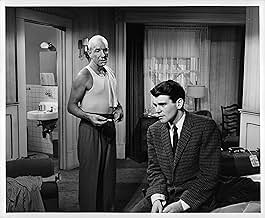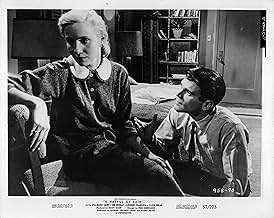IMDb रेटिंग
7.1/10
1.7 हज़ार
आपकी रेटिंग
अपनी भाषा में प्लॉट जोड़ेंA Korean War veteran's morphine addiction wreaks havoc upon his family.A Korean War veteran's morphine addiction wreaks havoc upon his family.A Korean War veteran's morphine addiction wreaks havoc upon his family.
- 1 ऑस्कर के लिए नामांकित
- 6 जीत और कुल 10 नामांकन
Gerald S. O'Loughlin
- Chuch
- (as Gerald O'Loughlin)
Tom Ahearne
- Bartender
- (बिना क्रेडिट के)
William Bailey
- Man in Elevator
- (बिना क्रेडिट के)
Gordon B. Clarke
- Middle-Aged Man
- (बिना क्रेडिट के)
Heinie Conklin
- Barfly
- (बिना क्रेडिट के)
Albert Dannibal
- The Thin Man
- (बिना क्रेडिट के)
Sayre Dearing
- Barfly
- (बिना क्रेडिट के)
Art Fleming
- Jack
- (बिना क्रेडिट के)
Jane Hoffman
- Lone Woman
- (बिना क्रेडिट के)
Jason Johnson
- Boss
- (बिना क्रेडिट के)
Jay Jostyn
- Doctor
- (बिना क्रेडिट के)
फ़ीचर्ड समीक्षाएं
My summary might scare off some, but this is not the infamous "Reefer" movies of earlier days. This film has a great cast, who work with a great script. Don Murray plays an unlikely addict because he acquired his habit as a wounded soldier. His addiction and effects on himself and family are the plot focus. The actors draw out our pity and condemnations. The film does not preach about addiction. The film does portray an ugly problem about drugs, be they legal or illegal. My generation which came to age in the 60's saw many films which showed the "fun" side of getting smashed or high. A great number of them are no longer living, or are shadows of themselves because of addiction.
10mkosko
My first viewing of this movie was when i was eleven years old. It was being aired on the Friday night late show. I found it to be a gripping tale of a Korean war veteran returning home with a heroin addiction which was brought on from battle wounds recieved during the conflict.After that point was established you tend to feel for Johnny Pope and his family. A hero in his fathers eyes with his brother Polo paling in comparison in dads opinion. Johnny's wife and brother do everything they can to cope with his addiction and keep John Sr. in the dark about it building to the eventual climax when the truth comes out.A well written and acted tale that left an impression on me.
Intense and harrowing family drama typical of 50's style New York film-making. At the time, Hollywood was caught up in the double-whammy of TV competition and Cold War scare, so programming from the West Coast tended to emphasize big screen spectacle and politically safe subject matter. On the other hand, films from New York City, such as On the Waterfront and Edge of the City, emphasized small screen black & white, with urban settings and grittier subject matter.
Here it's drug addiction among a white-collar family ensconced in a Manhattan apartment. Hooked because of a war wound, Johnny (Don Murray) has a loving wife Celia (Eva Marie Saint), a loyal brother Polo (Anthony Franciosa), and an arrogantly insensitive father (Lloyd Nolan). There's real tension between husband and wife because Johnny is fearful of confessing his secret addiction. As a result, Celia feels neglected by his drug-created absences, while Johnny keeps losing jobs, and Polo ends up paying for his brother's habit. When Dad comes from Florida to collect promised money from Polo that he now doesn't have, events begin spiraling out of control.
Needless to say, acting here is front and center stage. The cast comes through beautifully, especially Franciosa as the intensely conflicted Polo who's attracted to his brother's wife while providing Johnny the needed support. And it doesn't help that Dad has always favored Johnny even as Polo must keep that same brother's ruinous secret. Poor Polo, the stress may appear to be on Johnny and his addiction, but it's really Polo who's emotionally torn.
This is not a movie for the depressed. Nearly all the scenes take place in the couple's rather drab apartment, except for a few street shots of Johnny trapped by Manhattan's towering impersonality. This is urban despair 50's style, when drugs and addiction were considered a strictly urban problem related to unwholesome types that thrived there. The darker skinned drug-pusher Mother (Henry Silva)) conforms to a popular stereotype of the time, along with his be-bopping confederate Apple (Bill Hickey), another popular stereotype. And when Mother says it's only business after threatening Johnny, we get a different perspective on the rise of post-war commercialism. (Why the lugubrious name "Mother" for a low-life drug dealer? My guess is that it characterizes in ironic fashion the dependent relation addicts have with their supplier.)
The image that stays with me is a strung-out Johnny, hunkered down in his coat, drifting alone on the streets of Manhattan. It's a grim existential moment, especially for that upbeat decade. Anyway, the movie remains a dramatic powerhouse that still packs a wallop. And even that bane of 50's films, the required happy ending, is finessed in suitably ambiguous fashion.
Here it's drug addiction among a white-collar family ensconced in a Manhattan apartment. Hooked because of a war wound, Johnny (Don Murray) has a loving wife Celia (Eva Marie Saint), a loyal brother Polo (Anthony Franciosa), and an arrogantly insensitive father (Lloyd Nolan). There's real tension between husband and wife because Johnny is fearful of confessing his secret addiction. As a result, Celia feels neglected by his drug-created absences, while Johnny keeps losing jobs, and Polo ends up paying for his brother's habit. When Dad comes from Florida to collect promised money from Polo that he now doesn't have, events begin spiraling out of control.
Needless to say, acting here is front and center stage. The cast comes through beautifully, especially Franciosa as the intensely conflicted Polo who's attracted to his brother's wife while providing Johnny the needed support. And it doesn't help that Dad has always favored Johnny even as Polo must keep that same brother's ruinous secret. Poor Polo, the stress may appear to be on Johnny and his addiction, but it's really Polo who's emotionally torn.
This is not a movie for the depressed. Nearly all the scenes take place in the couple's rather drab apartment, except for a few street shots of Johnny trapped by Manhattan's towering impersonality. This is urban despair 50's style, when drugs and addiction were considered a strictly urban problem related to unwholesome types that thrived there. The darker skinned drug-pusher Mother (Henry Silva)) conforms to a popular stereotype of the time, along with his be-bopping confederate Apple (Bill Hickey), another popular stereotype. And when Mother says it's only business after threatening Johnny, we get a different perspective on the rise of post-war commercialism. (Why the lugubrious name "Mother" for a low-life drug dealer? My guess is that it characterizes in ironic fashion the dependent relation addicts have with their supplier.)
The image that stays with me is a strung-out Johnny, hunkered down in his coat, drifting alone on the streets of Manhattan. It's a grim existential moment, especially for that upbeat decade. Anyway, the movie remains a dramatic powerhouse that still packs a wallop. And even that bane of 50's films, the required happy ending, is finessed in suitably ambiguous fashion.
10dga11105
I check at least once a month to see if this fabulous film has finally been released on video. Just like the way that "Days of Wine and Roses" tackled the subject of alcohol addiction, this film tackled the subject of drug addiction like none other before or since. Terrific performances by all, especially Don Murray and Anthony Franciosa as the two brothers, each held to a different standard by a overbearing father played by Lloyd Nolan. There is also an appearance by a very young William Hickey of "Prizzi's Honor" fame in one of his first roles. This film is a window back in time to life in New York City in the 50's. I urge whoever owns the rights to this film, please release it on DVD
10mls4182
I have had relatives addicted to street drugs. As this film shows, overdose is the least of your worries. Addicts not only throw their own lives away, they drag their loved ones down with them. They not only destroy the love you have for them but they endanger your life along with theirs. They make the character more sympathetic by being a veteran with PTSD. This film should be shown in all schools starting in third grade. Although realistic it is still more sanitized that reality.
क्या आपको पता है
- ट्रिवियाAnthony Franciosa was nominated for a Tony Award for his performance as Polo in the original Broadway production. He was nominated for an Academy Award® for reprising the role in this film. Features Franciosa's only Oscar®-nominated performance.
- गूफ़When Johnny surprises Celia with dinner and flowers, the camera starts to back out of the kitchen, but something or someone runs into the curtain hanging on the right, causing it to move quite a bit.
- भाव
John Pope, Sr: Polo, You're a bum. You always were and you always will be.
- कनेक्शनReferenced in What's My Line?: Lew Hoad & Shelley Winters and Anthony Franciosa (1957)
- साउंडट्रैकDon't Get Around Much Anymore
(uncredited)
Music by Duke Ellington
[Played at Marty's Bar after Pop and Johnny show up]
टॉप पसंद
रेटिंग देने के लिए साइन-इन करें और वैयक्तिकृत सुझावों के लिए वॉचलिस्ट करें
- How long is A Hatful of Rain?Alexa द्वारा संचालित
विवरण
बॉक्स ऑफ़िस
- बजट
- $18,20,000(अनुमानित)
- चलने की अवधि1 घंटा 49 मिनट
- रंग
- पक्ष अनुपात
- 2.35 : 1
इस पेज में योगदान दें
किसी बदलाव का सुझाव दें या अनुपलब्ध कॉन्टेंट जोड़ें



































